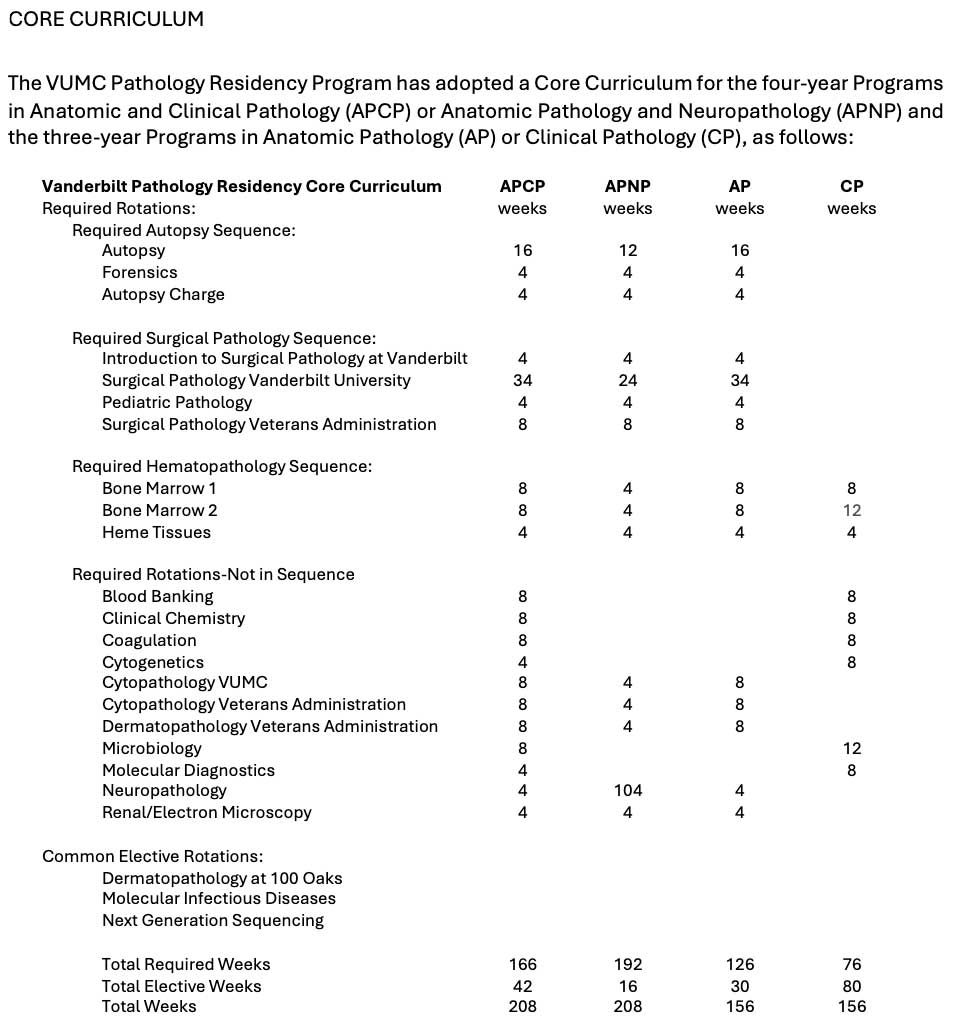Core Curricula
The VUMC Pathology Residency Program has adopted a Core Curriculum for the four-year programs in Anatomic and Clinical Pathology (APCP) or Anatomic Pathology and Neuropathology (APNP) and the three-year programs in Anatomic Pathology (AP) or Clinical Pathology (CP), as follows:

Each academic year is divided into thirteen blocks of four weeks, each week and block usually beginning on a Monday. In the APCP4 Program, the first year of Residency training is centered in AP and two of its three major services, Surgical and Autopsy Pathology. House Staff may anticipate the performance of approximately 30 – 35 autopsies during the first year. Each autopsy case is reviewed by a member of the faculty and the case is completed by the Resident with faculty supervision. Currently, first year House Staff spend approximately five blocks on the Autopsy service and three blocks in Surgical Pathology at Vanderbilt rotating on multiple specialty services. In the second half of their first year, Residents will also typically spend one month rotating in Dermatopathology at the VA. The remaining blocks serve as an introduction to CP, with rotations in some of the core clinical laboratory modules (Chemistry, Molecular Diagnostics, Bone Marrow 1, Coagulation, Transfusion Medicine and Microbiology. Another major facet of the first year training is the role of the Residents as laboratory and autopsy instructors for second year Vanderbilt medical students during the fall semester.
The second and third years of training extend the Resident's diagnostic capabilities in both AP and CP, with additional training and increasing responsibility in Laboratory Medicine and Surgical Pathology. The rotations, especially those in Clinical Pathology, have adopted a Diagnostic Management Team model that involves Residents as consultants for complex testing that may cross traditional laboratory boundaries. Residents rotate in Surgical Pathology at the VA, to experience general signout practice. Rotations in Cytopathology (VUMC and VA), EM/Renal Pathology, Molecular Pathology, Bone Marrow 2 and Heme Tissues complete the experience. Each third year Resident typically functions in a supervisory capacity on the Autopsy service for one block, providing experience as a Service Director, as well as exposure to a wide range of pathologic material.
By the fourth year of training, most residents have established well-developed career goals. At this point in residency training, the program provides flexibility to allow elective concentration in one or several areas of special interest. Additional required rotations include Neuropathology, diagnostic Electron Microscopy/Renal Pathology, and Forensic Pathology. For residents with demonstrated interest in research and/or academic careers, the department may offer a research year under the supervision of faculty with active investigative programs.
RESEARCH OPPORTUNITIES
VUMC is among the leading research institutions in the United States. The Department of Pathology, Microbiology and Immunology has a strong research faculty that is rapidly growing, with research and clinical faculty who are enthusiastically committed to mentoring interested residents. In addition to developing clinical expertise, residents are strongly encouraged to pursue methods development research projects or clinical, translational or basic science research projects during their residency training. Special funds are set aside to support resident research and attendance at national meetings.
PUBLICATIONS
Residents are strongly encouraged to pursue pathology practice and training intellectually, with curiosity and imagination, and, as appropriate, to submit manuscripts for publication during residency training. Publishing is considered a valuable learning experience and an important part of the residency program, regardless of the eventual practice setting for the individual resident. Publications may be related to methods development, clinical or basic research, or reviews. Residents should identify an appropriate faculty research preceptor by the middle of the second year of training or request a meeting with the Program Director or the Chair for guidance.
TEACHING OPPORTUNITIES
Residents participate in many and varied teaching conferences conducted by the department, as one of the main goals of the program is to provide residents with skills in communication, public speaking, and teaching. Residents are required to participate and present in many intradepartmental and interdepartmental conferences with faculty support and guidance. Senior residents are also expected to serve as important teaching resources for junior residents in most of the program’s longitudinal rotations. Residents who have a particular interest in medical school teaching can participate at Vanderbilt University School of Medicine with the involvement of the many PMI faculty who participate in medical school teaching, including Dr. Jonathan Douds and Dr. Aaron Shaver. Additionally, participation in teaching the Vanderbilt Medical Technology Course is encouraged.